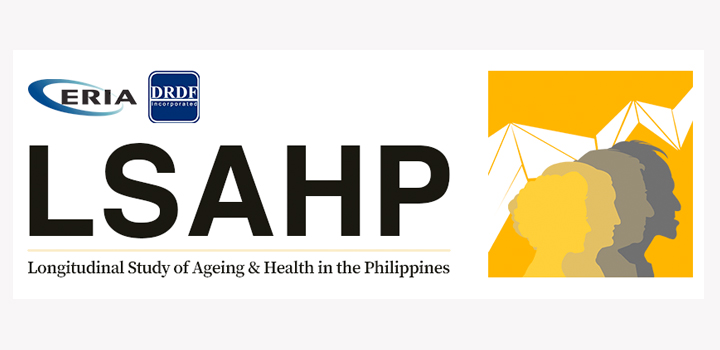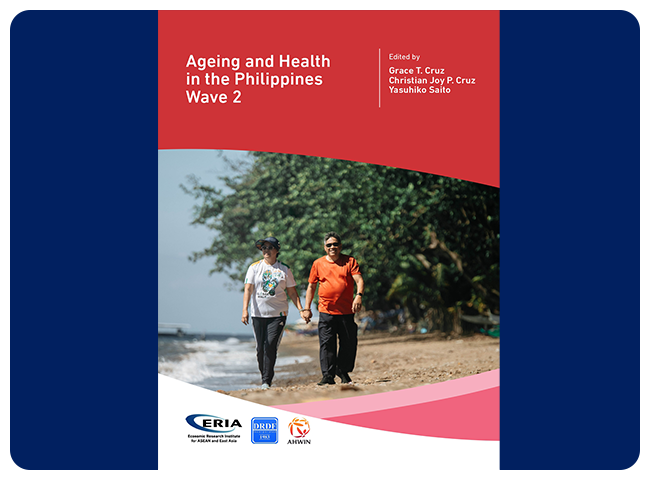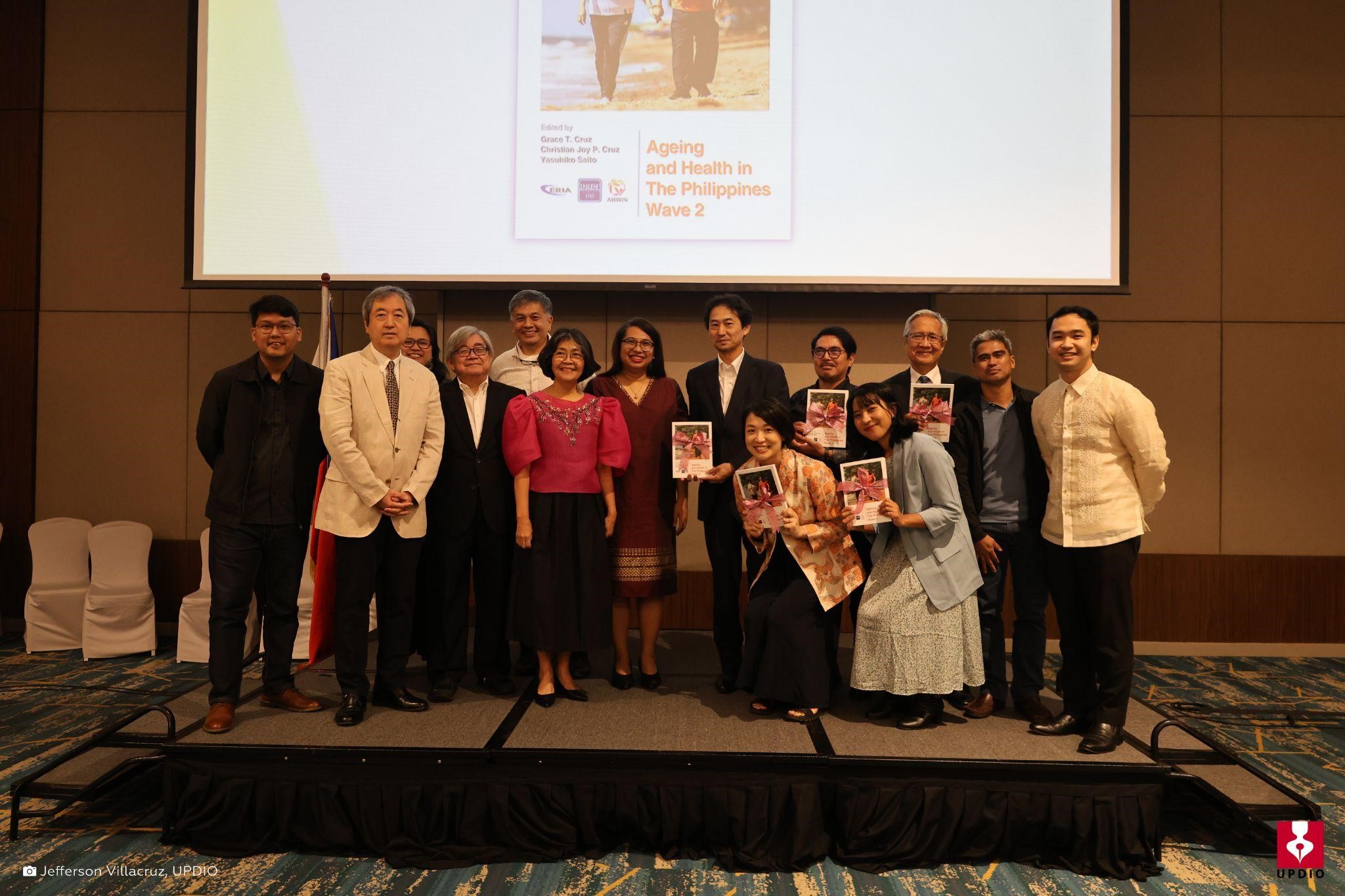
The Longitudinal Study of Ageing and Health in the Philippines (LSAHP) is the first nationally representative, multi-actor panel study on aging in the Philippines, with information collected from community-dwelling Filipinos aged 60 and over, their primary or potential caregivers, and their adult children. It is designed to (1) investigate the health status and well-being of older Filipinos and the factors influencing these outcomes and (2) analyze the factors associated with health transitions. The LSAHP is also the first Philippine aging study to utilize the Short Portable Mental Status Questionnaire (SPMSQ), a cognitive assessment tool used to determine an older person’s eligibility and fitness to answer factual questions.
The LSAHP has completed two waves of data collection. It employed a multistage sampling design with provinces as the primary sampling units, barangays (villages) as the secondary sampling units, and older persons as the ultimate sampling units. The baseline survey, Wave 1 (W1), was conducted from December 2018 to March 2019, gathering data from 5,985 respondents with a response rate of 94%. The follow-up survey, Wave 2 (W2), was conducted from January to April 2023, four years after the initial survey. While it was initially planned for two years after W1, the COVID-19 pandemic caused a delay. Out of the original participants, 4,397 were still alive, 1,579 had passed away, and nine were lost to follow-up in W2. The W2 survey interviewed 4,011 surviving respondents and obtained information from 1,514 informants of deceased respondents, achieving a response rate of 93%.
The LSAHP W1 and W2 data provide comprehensive information on the health, economic, and overall well-being of older Filipinos. The W2 introduces new areas of focus, including nutrition, updated measures of well-being, geospatial factors, adult mortality, and experiences related to the COVID-19 pandemic. Successive rounds of the LSAHP will further deepen our understanding of the trajectory of aging in the country, at the individual and societal levels. These data are intended to serve as a valuable resource in crafting evidence-based policies and programs for the country’s older population.
The LSAHP is funded by the Economic Research Institute for ASEAN and East Asia (ERIA) and implemented by the Demographic Research and Development Foundation, Inc.
The Longitudinal Study of Ageing and Health in the Philippines (LSAHP) is the first nationally representative, multi-actor panel study on aging in the Philippines, with information collected from community-dwelling Filipinos aged 60 and over, their primary or potential caregivers, and their adult children. It is designed to (1) investigate the health status and well-being of older Filipinos and its possible correlates and (2) assess the determinants of and transitions in health status and overall well-being. The baseline survey, conducted in 2018, employed a multistage sampling design with provinces as the primary sampling units, barangays (villages) as the secondary sampling units, and older persons (OP) as the ultimate sampling units. The LSAHP is also the first Philippine aging study to use the Short Portable Mental Status Questionnaire (SPMSQ), a cognitive assessment test to determine OP’s eligibility and fitness to answer factual questions.
A total of 5,985 OPs were interviewed, garnering a response rate of 94%, while 5,209 OPs were eligible for interview without a proxy. The LSAHP baseline data provide comprehensive information on the health, economic, and overall well-being of older Filipinos. Successive rounds of the LSAHP will further deepen our understanding of the trajectory of aging in the country, at the individual and societal levels. These data are intended to be a valuable resource in crafting evidence-based policies and programs for the older population in the country. The LSAHP is funded by the Economic Research Institute for ASEAN and East Asia (ERIA) and implemented by the Demographic Research and Development Foundation, Inc.
Resources
LSAHP Wave 2
Partner/s
Economic Research Institute for ASEAN and East Asia (ERIA)
Contact Information
Grace T. Cruz, Ph.D.
Principal Investigator
+63 2 8981 8500 local 2457 / 2468
lsahp2018.drdf@gmail.com
Fun Facts
Related Updates
The Longitudinal Study of Ageing and Health in the Philippines Wave 2
Ageing and Health in the Philippines – Wave 2 is the second publication of the...
The Longitudinal Study of Ageing and Health in the Philippines (LSAHP) Wave 2 – Executive Summary
The Longitudinal Study of Ageing and Health in the Philippines (LSAHP) is the first nationally...
DRDF, ERIA, and UPPI Conduct Ageing and Health Wave 2 Dissemination Forum
Quezon City, Philippines, August 16, 2024: The Demographic Research and Development Foundation, Inc. (DRDF), Economic...
In the News
ERIA Engages Philippine Stakeholders on Silver Economy and Social Welfare Policies
Manila, 10–11 December 2025: ERIA visited Manila to hold discussions on the Silver Economy and social...
Investing in health care for the elderly
This Oct. 1 to 7, we join the nation in celebrating Elderly Filipino Week, with...
Salceda eyes new insurance scheme for senior citizens
House Committee on Ways and Means Chairman Joey Sarte Salceda is pushing for a specialized...
A mother’s mantra: Build a financially secure future
MANILA, Philippines — What kind of life do you see for yourself when you hit...
What can we do to prevent falls in elderly Filipinos?
Heads of households should conduct a simple ‘fall checklist,’ which includes removing or repairing anything...
Approximately 30% of older adults worldwide suffer from falls each year, making falls a critical public health issue
This study utilized baseline survey data from the Longitudinal Study of Ageing and Health in...





